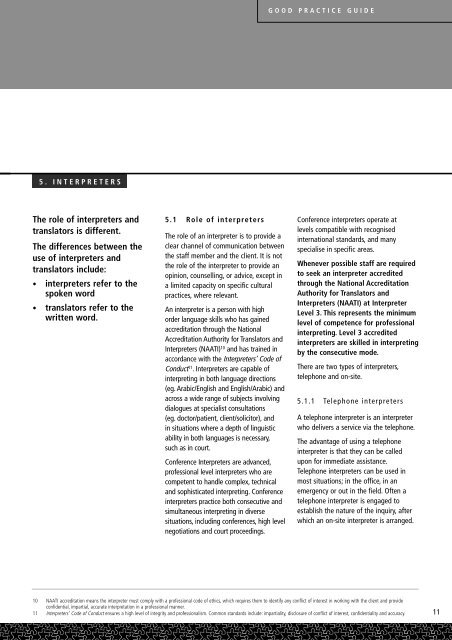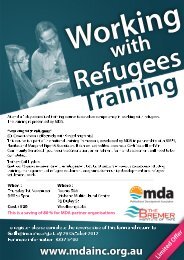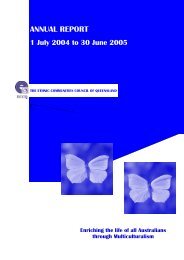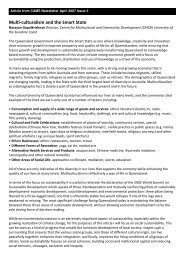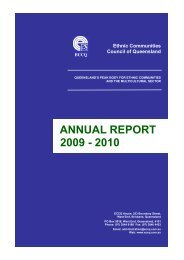Good Practice Guide
CALD Good practice guide
CALD Good practice guide
Create successful ePaper yourself
Turn your PDF publications into a flip-book with our unique Google optimized e-Paper software.
GOOD PRACTICE GUIDE<br />
5. INTERPRETERS<br />
The role of interpreters and<br />
translators is different.<br />
The differences between the<br />
use of interpreters and<br />
translators include:<br />
• interpreters refer to the<br />
spoken word<br />
• translators refer to the<br />
written word.<br />
5.1 Role of interpreters<br />
The role of an interpreter is to provide a<br />
clear channel of communication between<br />
the staff member and the client. It is not<br />
the role of the interpreter to provide an<br />
opinion, counselling, or advice, except in<br />
a limited capacity on specific cultural<br />
practices, where relevant.<br />
An interpreter is a person with high<br />
order language skills who has gained<br />
accreditation through the National<br />
Accreditation Authority for Translators and<br />
Interpreters (NAATI) 10 and has trained in<br />
accordance with the Interpreters’ Code of<br />
Conduct 11 . Interpreters are capable of<br />
interpreting in both language directions<br />
(eg. Arabic/English and English/Arabic) and<br />
across a wide range of subjects involving<br />
dialogues at specialist consultations<br />
(eg. doctor/patient, client/solicitor), and<br />
in situations where a depth of linguistic<br />
ability in both languages is necessary,<br />
such as in court.<br />
Conference Interpreters are advanced,<br />
professional level interpreters who are<br />
competent to handle complex, technical<br />
and sophisticated interpreting. Conference<br />
interpreters practice both consecutive and<br />
simultaneous interpreting in diverse<br />
situations, including conferences, high level<br />
negotiations and court proceedings.<br />
Conference interpreters operate at<br />
levels compatible with recognised<br />
international standards, and many<br />
specialise in specific areas.<br />
Whenever possible staff are required<br />
to seek an interpreter accredited<br />
through the National Accreditation<br />
Authority for Translators and<br />
Interpreters (NAATI) at Interpreter<br />
Level 3. This represents the minimum<br />
level of competence for professional<br />
interpreting. Level 3 accredited<br />
interpreters are skilled in interpreting<br />
by the consecutive mode.<br />
There are two types of interpreters,<br />
telephone and on-site.<br />
5.1.1 Telephone interpreters<br />
A telephone interpreter is an interpreter<br />
who delivers a service via the telephone.<br />
The advantage of using a telephone<br />
interpreter is that they can be called<br />
upon for immediate assistance.<br />
Telephone interpreters can be used in<br />
most situations; in the office, in an<br />
emergency or out in the field. Often a<br />
telephone interpreter is engaged to<br />
establish the nature of the inquiry, after<br />
which an on-site interpreter is arranged.<br />
10 NAATI accreditation means the interpreter must comply with a professional code of ethics, which requires them to identify any conflict of interest in working with the client and provide<br />
confidential, impartial, accurate interpretation in a professional manner.<br />
11 Interpreters’ Code of Conduct ensures a high level of integrity and professionalism. Common standards include: impartiality, disclosure of conflict of interest, confidentiality and accuracy.<br />
11


